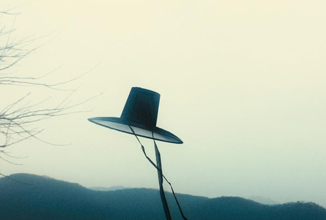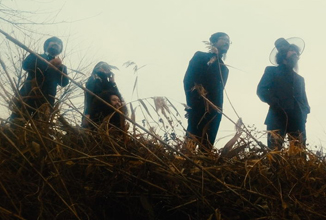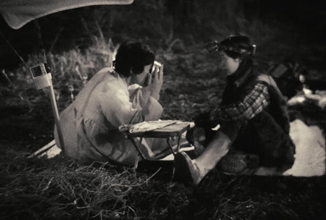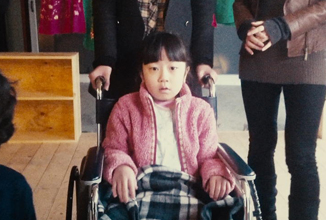Synopsis:
Gi-suk (Oh Kwang-rok) heads out to the countryside to spend some time fishing alone and, after setting up his various reels, settles down to wait for a fish to bite. As night begins to fall, he finally hears the tingle of the bite alarm signaling that he has snared something, but on struggling to land his 'catch' he finds not a fish on his hook but, instead, the limp and seemingly lifeless body of a young woman (Lee Jeong-hyeon), dressed in funeral attire, tangled up in his line…
Review:
On word first surfacing that Park Chan-wook had made a short film (33 minutes duration) using the iPhone4, the media (both Korean film and mobile phone related) and even the mainstream press went into mass overdrive on the subject, but while the initial references and suppositions to the use of mobile technology in the filmmaking process clearly didn't do the marketing of either the film or the iPhone any harm, to say the least, the subsequent ongoing discussions bringing to light the fact that Night Fishing cost $130,000; used eight iPhones in tandem, each fitted with professional film lenses; utilised a large amount of post-production work, including colouration and CGI; and had a production crew of eighty people, were unlikely to make the average iPhone user think "Oh, I feel inspired... I want to make a movie", especially considering the fact that the majority of iPhone owners would already have been aware of what the technology was capable.
Also, it almost goes without saying that, on learning that Park Chan-wook had made any sort of movie at all (using whatever technology he chose to), Korean film fans would have been clamoring to find out more anyway; post as much info as they could on as many sites and blogs as possible; and (most importantly) make efforts to see the film, regardless of whether it had anything to do with the iPhone or not. Even film fans who are not particularly obsessive about Korean cinema are fairly likely to be aware of who Park Chan-wook is (not least because the majority of the mainstream press and media, more often than not, preface his name with descriptions such as "the acclaimed director of Oldboy") and one can assume that if they were to search out any new film of his it would largely be because of his previous work and reputation alone, while the few cinema-goers who aren't aware of him are unlikely to be chomping at the bit to watch a short film made by someone they've never heard of, especially if it's been "made on a mobile phone".
I fully admit that all of the above had me fearing that such hype (appearing as little more than a rather contrived marketing ploy) was being used to perhaps cover a rather lackluster or, at best, slight film, but frankly I couldn't have been more wrong if I'd tried - for Night Fishing is an utterly sublime cinematic work, an artform of near perfection which not only gives the majority of Park Chan-wook's previous films a run for their money, but also even manages to stand out from them on more than one occasion (and trust me, I make that statement as a huge Park Chan-wook fan).
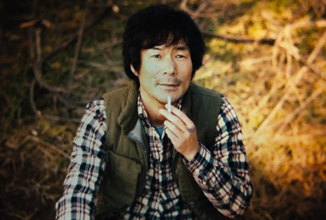 |
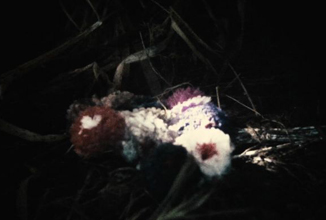 |
Night Fishing (the literal translation of the Korean title being “ups and downs”) begins with a fairly off-the-wall (complete) music track by contemporary Korean band 'UhUhBoo Project', and while the predominant featuring of what is essentially a music video may, at first glance, seem somewhat out of place in a cinematic narrative work, its appearance instantly allows an early referencing of the idea that events and situations in Night Fishing (including the film itself) are often far from what they initially appear to be - subsequently also shown to be the case in the appearance of the seemingly dead body; the music that we assume is simply the radio playing random songs; as well as in Gi-suk's place in the overall scheme of things; and even in the reality behind his fishing by the lake.
Not only that, but this avant-garde musical piece (when considered alongside the music of a shamanic ritual that takes place in the latter stages of the film) also serves as a contrast between contemporary and traditional Korea as a whole, just as the ritual itself bridges the gap between the old and the new, the living and the dead, and though it isn't apparent until much later in proceedings, the relevance of the lyrics of both the major musical elements in Night Fishing having references to love, life and death bring those worlds ever closer from the very outset of the film - long before we are consciously aware that that is the case.
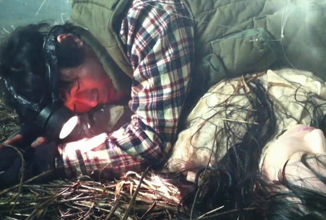 |
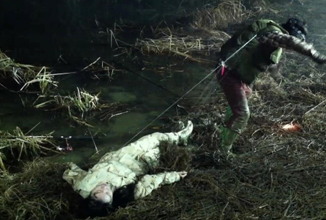 |
The main story of Gi-suk's fishing trip unfolds gently but never drags (thanks, in part, to the short running time preventing any narrative over-indulgences), and as the plot begins to darken, the cinematography duly moves from full colour (used in the early daytime scenes) to black and white (following the nighttime discovery of the girl's body), only shifting back to colour for scenes involving G-suk's family and the shamanic ritual - thereby allowing a stark visual contrast between their world and his.
Not only that, but the visual limitations of the iPhone are deliberately utilised (and even pushed to almost past their limits) during the night scenes by the lake, with the inherent lack of depth of field being used to great effect to remove clarity from background elements at the same time as racking up the contrast of the foreground imagery - thus serving to give an other-worldly quality to the interactions between Gi-suk and his 'catch'.
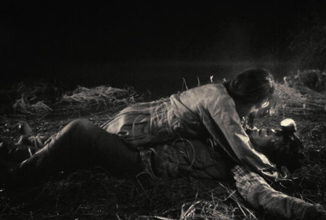 |
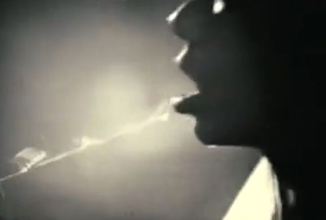 |
However, these tonal changes are not the only differences between the two main narrative threads, and while the scenes at the lake positively scream Park Chan-wook, not least by the inclusion of more than one instance of dark humour (the most notable of which being the superb scene in which Gi-suk desperately tries to extricate himself from the 'clutches' of the lifeless girl's body - their entanglement in the fishing line thwarting his every attempt and simply dragging her body after him, causing her to move rather like the undead), the latter scenes featuring Gi-suk's family, the shaman and shamanic rite, feel somewhat different and it is likely that here we are witnessing the input of Park Chan-kyong - Park Chan-wook's brother and co-director of Night Fishing. Certainly, the ultimate focus on the shamanic ritual, as well as the themes, legends and mythology brought to the fore by it, are clearly down to him - his previous short films (in his career as a visual artist) reputedly having featured some very similar ideas and references on several occasions.
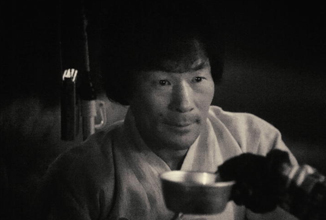 |
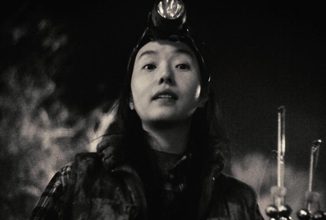 |
Cast:
Oh Kwang-rok (as Gi-suk) gives an accomplished and note-worthy performance in Night Fishing, easily equalling those of his previous films, but Lee Jeong-hyeon's portrayal of the seemingly dead girl/shaman is so utterly astonishing that she, time and again, puts him firmly in the shade.
Both an actress and a Korean pop singer (better known for the latter), Lee Jeong-hyeon's casting in Night Fishing simply couldn't be bettered - single-handedly raising the level of proceedings at every single turn. She (seemingly almost effortlessly) owns every frame of every scene in which she appears, regularly succeeding in utterly changing the overall feeling of proceedings with just a glance, a move of her head or a sung musical note.
All of the above comes even before I even properly mention her utterly haunting vocals during the shamanic ritual itself - in short, her singing and accompanying acting performance simply cannot fail to stay with viewers long after the film credits roll.
I could use any and every superlative I could possibly think of (and virtually already have) to try to convey just how jaw-droppingly mesmerizing she is to watch in Night Fishing, but in doing so I still wouldn't have gone anywhere near far enough, and, at the end of the day, the only way to truly appreciate what she brings to the film is to see her performance for yourself. Incredible!
The rest of the main cast play largely supporting roles, but each performs admirably throughout.
Main Cast: Lee Jeong-hyeon, Oh Kwang-rok, Lee Yong-nyeo, Kim Hwan-hee
Directed by: Park Chan-wook, Park Chan-kyong
Summary:
Take the fact that Night Fishing was made using the iPhone4 and completely set it aside, for even if you took all the best elements from Park Chan-wook's previous films, wrapped them up within a gripping narrative and added the beyond exemplary cast performances seen here, you still wouldn't come even close to creating a film as astounding as this, regardless of what technology was used.
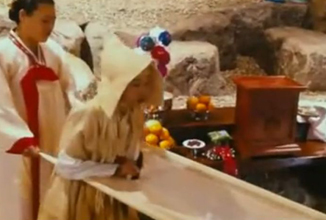 |
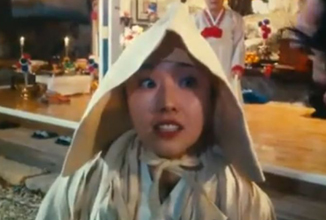 |
This review of Night Fishing comes following a screening of the film at the London Korean Film Festival 2011, as part of the Mise En Scène Shorts section. I'd sincerely like to thank everyone involved in the organisation of the festival for allowing me to see this astounding film, as well as many others throughout the LKFF.
|


